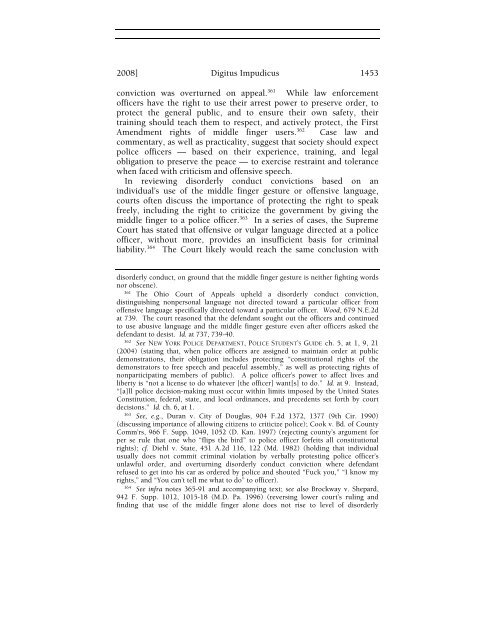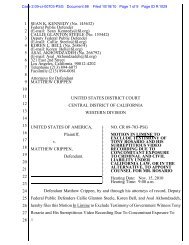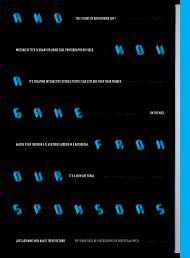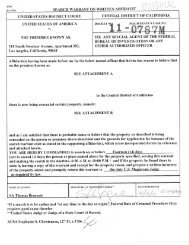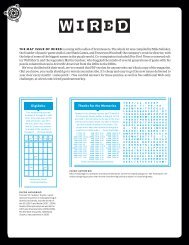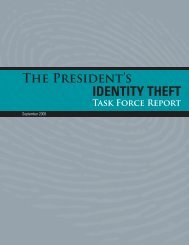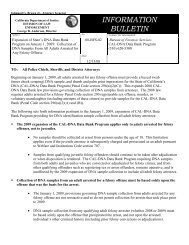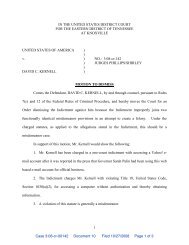Digitus Impudicus: The Middle Finger and the Law - Wired
Digitus Impudicus: The Middle Finger and the Law - Wired
Digitus Impudicus: The Middle Finger and the Law - Wired
You also want an ePaper? Increase the reach of your titles
YUMPU automatically turns print PDFs into web optimized ePapers that Google loves.
2008] <strong>Digitus</strong> <strong>Impudicus</strong> 1453<br />
conviction was overturned on appeal. 361 While law enforcement<br />
officers have <strong>the</strong> right to use <strong>the</strong>ir arrest power to preserve order, to<br />
protect <strong>the</strong> general public, <strong>and</strong> to ensure <strong>the</strong>ir own safety, <strong>the</strong>ir<br />
training should teach <strong>the</strong>m to respect, <strong>and</strong> actively protect, <strong>the</strong> First<br />
Amendment rights of middle finger users. 362 Case law <strong>and</strong><br />
commentary, as well as practicality, suggest that society should expect<br />
police officers — based on <strong>the</strong>ir experience, training, <strong>and</strong> legal<br />
obligation to preserve <strong>the</strong> peace — to exercise restraint <strong>and</strong> tolerance<br />
when faced with criticism <strong>and</strong> offensive speech.<br />
In reviewing disorderly conduct convictions based on an<br />
individual’s use of <strong>the</strong> middle finger gesture or offensive language,<br />
courts often discuss <strong>the</strong> importance of protecting <strong>the</strong> right to speak<br />
freely, including <strong>the</strong> right to criticize <strong>the</strong> government by giving <strong>the</strong><br />
middle finger to a police officer. 363 In a series of cases, <strong>the</strong> Supreme<br />
Court has stated that offensive or vulgar language directed at a police<br />
officer, without more, provides an insufficient basis for criminal<br />
liability. 364 <strong>The</strong> Court likely would reach <strong>the</strong> same conclusion with<br />
disorderly conduct, on ground that <strong>the</strong> middle finger gesture is nei<strong>the</strong>r fighting words<br />
nor obscene).<br />
361 <strong>The</strong> Ohio Court of Appeals upheld a disorderly conduct conviction,<br />
distinguishing nonpersonal language not directed toward a particular officer from<br />
offensive language specifically directed toward a particular officer. Wood, 679 N.E.2d<br />
at 739. <strong>The</strong> court reasoned that <strong>the</strong> defendant sought out <strong>the</strong> officers <strong>and</strong> continued<br />
to use abusive language <strong>and</strong> <strong>the</strong> middle finger gesture even after officers asked <strong>the</strong><br />
defendant to desist. Id. at 737, 739-40.<br />
362 See NEW YORK POLICE DEPARTMENT, POLICE STUDENT’S GUIDE ch. 5, at 1, 9, 21<br />
(2004) (stating that, when police officers are assigned to maintain order at public<br />
demonstrations, <strong>the</strong>ir obligation includes protecting “constitutional rights of <strong>the</strong><br />
demonstrators to free speech <strong>and</strong> peaceful assembly,” as well as protecting rights of<br />
nonparticipating members of public). A police officer’s power to affect lives <strong>and</strong><br />
liberty is “not a license to do whatever [<strong>the</strong> officer] want[s] to do.” Id. at 9. Instead,<br />
“[a]ll police decision-making must occur within limits imposed by <strong>the</strong> United States<br />
Constitution, federal, state, <strong>and</strong> local ordinances, <strong>and</strong> precedents set forth by court<br />
decisions.” Id. ch. 6, at 1.<br />
363 See, e.g., Duran v. City of Douglas, 904 F.2d 1372, 1377 (9th Cir. 1990)<br />
(discussing importance of allowing citizens to criticize police); Cook v. Bd. of County<br />
Comm’rs, 966 F. Supp. 1049, 1052 (D. Kan. 1997) (rejecting county’s argument for<br />
per se rule that one who “flips <strong>the</strong> bird” to police officer forfeits all constitutional<br />
rights); cf. Diehl v. State, 451 A.2d 116, 122 (Md. 1982) (holding that individual<br />
usually does not commit criminal violation by verbally protesting police officer’s<br />
unlawful order, <strong>and</strong> overturning disorderly conduct conviction where defendant<br />
refused to get into his car as ordered by police <strong>and</strong> shouted “Fuck you,” “I know my<br />
rights,” <strong>and</strong> “You can’t tell me what to do” to officer).<br />
364 See infra notes 365-91 <strong>and</strong> accompanying text; see also Brockway v. Shepard,<br />
942 F. Supp. 1012, 1015-18 (M.D. Pa. 1996) (reversing lower court’s ruling <strong>and</strong><br />
finding that use of <strong>the</strong> middle finger alone does not rise to level of disorderly


